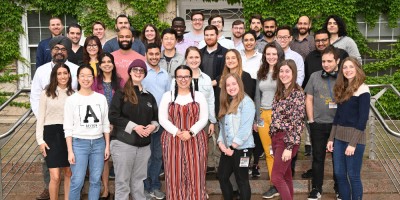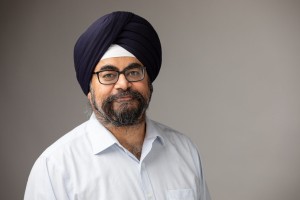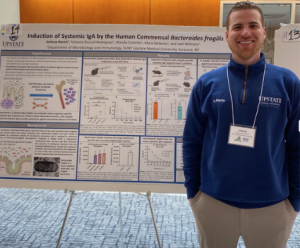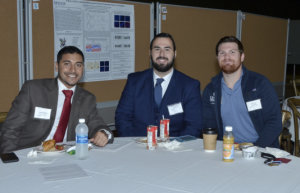Program Highlight- Fostering the future of physician scientists: Upstate Medical University's MD/PhD program paves the way with innovative support initiatives and community building
For medical students who have a passion for both patient care and research, the decision to pursue a joint MD/PhD degree can be both challenging and rewarding. Students double their time spent in medical school and join programs that are on average made up of around 90 students, compared to the hundreds of students that make up most medical schools. For those that choose this route at Upstate Medical University, program leaders are working tirelessly to find unique ways to support students, helping create the next generation of well-rounded physician scientists.

Upstate Medical University's MD/PhD program trains future physician scientists to bring the power of modern science to our understanding and treatment of human disease..
Dr. Amit Dhamoon, Director of the MD/PhD program, acknowledges the challenges of the long, sometimes difficult road to becoming a physician scientist when outlining the goals of his program.
“A concern for a lot of medical students is the way that MD/PhD programs are broken up; students complete the first two years of medical school, then leave for four years to complete their PhD,” he explains. “When they come back to the 3rd and 4th year of medical school, they worry that they've lost a lot of the skills that they learned in the first two years of medical school. One of my goals was to continue clinical skill building so that patients were the focus, even when students were in the lab.”

Amit Dhamoon, MD, PhD, director of Upstate's MD/PhD program. Dr. Dhamoon is also a 2007 graduate of the program.
To enhance the clinical skills of MD/PhD students, they’ve introduced innovative initiatives like Grand Rounds and the Standardized Patient Training Program.
“With our Grand Rounds course, it’s a chance to meet weekly and talk science and medicine,” says Dhamoon. “It's an environment where we're usually talking about something very challenging, where no one is the expert in the room. Everyone's out of their element, including me as their director, and we work through a clinical case and collaborate.”
“The Standardized Patient Training Program was born from a student who was nervous about transitioning back to medical school,” says Andrea Cifonelli, the MD/PhD Program Coordinator. Working with the hospital’s Standardized Patient program, they developed a way for students to stay familiar with treating patients ahead of returning to their third year. She credits the size of the program and supportive leadership with the ability to quickly address student concerns and turn ideas into action.
Dhamoon emphasizes Upstate’s student-first approach. “What we're trying to do is to support our students’ individual learning styles. Some students don’t learn effectively when they are lectured at and asked to regurgitate material for a test. I would like students to interact with the material meaningfully, teach themselves, and their colleagues, and learn collaboratively. Hopefully, with this approach, we'll create more well-rounded residents and physicians."
The program statistics show that this approach is producing results; 100% of Upstate MD/PhD students match with a residency program after they graduate. Every year, they see students awarded with grants for their research and pre-doctoral efforts; either from the NIH or organizations like the American Heart Association. One standout student, Harsimranjit (HJ) Sekhon, has published six papers, listed as the first author. Program graduates end up in prestigious programs across the country; completing residencies in places like Johns Hopkins, Yale, Cornell, and more.

Md/PhD student Joshua Harris presenting research conducted as he completes the PhD portion of his degree.
These efforts to provide student-focused learning opportunities don’t go unnoticed by students. “The program has worked hard to make sure that we can focus on what we need to while we're doing it, but also prepares us for upcoming transitions and prepares us to do both of those things in our future,” says current MD/PhD student Joshua Harris. He’s currently in the final year of his PhD; he’s been working in the microbiology and immunology department studying how the microbes in our gut shape our antibody responses, the results of which could have a big impact on vaccine development.
“There’s a huge shift in how you learn in a PhD program compared to how you learn in medical school,” adds fellow student Tyler Paul. Paul’s PhD work is in the cell and developmental biology department, studying a protein that’s part of the body’s immune response and is frequently found to be overexpressed in some cancers. “Andrea and Dr. Dhamoon foster all the support that I could possibly want from a program like this. I don't know if I'm able to phrase properly just how grateful I am for that support and how much help it has been.”

Md/PhD students Tyler Paul (far right) with fellow students Joseph Mauro (left) and Nick Brennan (middle).
With all the challenges presented by pursuing an MD and PhD degree simultaneously, why do students choose this route? “I chose this because I really like the intersection between medicine and science,” says current student Jennifer Messina. “There's this huge gap where many great scientific discoveries never make it to clinic. You need people who understand both sides of research and medicine to fill that gap.” Messina is working on the PhD portion of her degree in the department of Pharmacology and is excited to be working with Upstate’s Sepsis Interdisciplinary Research Center, which gives her a unique look at how a dual degree can be put to good use. “We have the whole spectrum from basic scientists to strictly clinicians and clinician scientists in the middle who meet and discuss this overarching project of working on interventions for sepsis from all the different angles.”
MD/PhD candidate Jennifer Messina presenting her research at the 2023 Tri-Institutional MD/PhD Conference.
Drawing on his own experience of completing an MD/PhD degree, Dhamoon understands the importance and value of encouraging community-building within the program. “I felt like when I went to graduate school, I was completely disconnected from the medical school. Hopefully, these efforts we’re making will build resilience and community within our students.” These efforts include hosting events, picnics, and talent shows to get to know students on a personal level. Students themselves have come up with unique ways to make sure new and current students feel welcome.
“MD/PhD students start in June, months ahead of the rest of the medical students,” explains Messina. “I and a few other students came up with this idea that we should have our own orientation. Now they have a week of lunches with the students and key people that are going to help them as they're starting their first year.”
Messina was also on the committee of this year’s Tri-Institutional MD/PhD Conference; a rotating event including the University of Rochester and University of Buffalo that Upstate hosted this year. “It’s unique in its MD/PhD focus; panelists dive into what our career is going to be like and some of the struggles that we may face specifically as MD/PhD trainees. It also gives us a great opportunity to connect with other students who are going through the same things that we are.”
MD/PhD students who worked on the 2023 Tri-Institutional MD/PhD Conference (from left to right)- Gargi Mishra, Sanaea Bhagwagar, Jennifer Messina, and Maria Ortiz.
"Physician scientists are an endangered species;” says Dhamoon. “There are very few physician scientists out there, and there are lots of challenges for folks being successful." The program strives to build a resilient community by providing personalized support and creating comradery, all to encourage the next generation of physician scientists.
If you’re interested in Upstate’s MD/PhD program, you can visit https://www.upstate.edu/mdphd/ or email Andrea Cifonelli at cifonela@upstate.edu